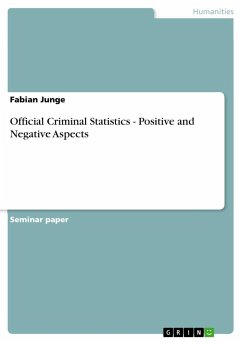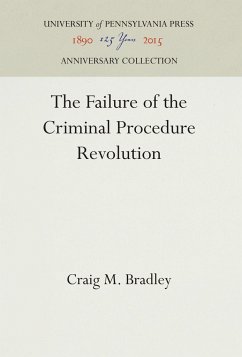
Official Criminal Statistics - Positive and Negative Aspects

PAYBACK Punkte
0 °P sammeln!
Seminar paper from the year 2010 in the subject Sociology - Law and Delinquency, grade: 1,7, Carl von Ossietzky University of Oldenburg, language: English, abstract: Statistics are one of the basic instruments on which our society relies. They are for instance used to detect trends or to develop theories on specific topics, or in order to get public-relevant information about the current situation in specific countries. Apart from that, also governments use statistics so as to make certain decisions or to develop long-term strategies on particular issues. Everything is at least in a small way ...
Seminar paper from the year 2010 in the subject Sociology - Law and Delinquency, grade: 1,7, Carl von Ossietzky University of Oldenburg, language: English, abstract: Statistics are one of the basic instruments on which our society relies. They are for instance used to detect trends or to develop theories on specific topics, or in order to get public-relevant information about the current situation in specific countries. Apart from that, also governments use statistics so as to make certain decisions or to develop long-term strategies on particular issues. Everything is at least in a small way affected by statistical data and their subsequent conclusions. In order to support the importance of official statistics, the Federal Constitutional Court of Germany stated in its decision on the census of population that official statistics are an indispensable basis for a welfare state. All this also applies to the official criminal statistics. Governments, for example, use them to improvethe performance of their own criminal justice system to achieve a safer environment for their citizens . The public is interested in the data to find out about the crime risks in their neighborhood and how the authorities are dealing with it. Criminal statistics are frequently used by politicians or in the mass media to substantiate an allegation without challenging the data. By doing this, it is assumed that the statistics are infallible and present a full image of the extent of crime This point, however, has to be critically judged, since official statistics seem to be "both partial and subjectively constructed" . In this paper, I will outline the positive and negative aspects of official criminal statistics. Moreover, I will discuss, if they have the ability to represent the full extent of crime or not.













